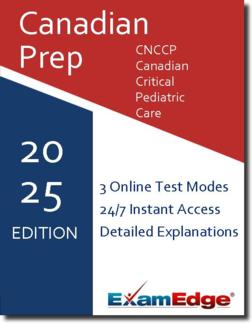CNCCP - Canadian Critical Pediatric Care (CNCCP) Practice Tests & Test Prep by Exam Edge - Topics
Based on 34 Reviews
- Real Exam Simulation: Timed questions and matching content build comfort for your CNCCP - Canadian Critical Pediatric Care test day.
- Instant, 24/7 Access: Web-based Canadian Critical Pediatric Care Nursing Examination practice exams with no software needed.
- Clear Explanations: Step-by-step answers and explanations for your Canadian exam to strengthen understanding.
- Boosted Confidence: Reduces anxiety and improves test-taking skills to ace your Canadian Critical Pediatric Care Nursing Examination (CNCCP).



